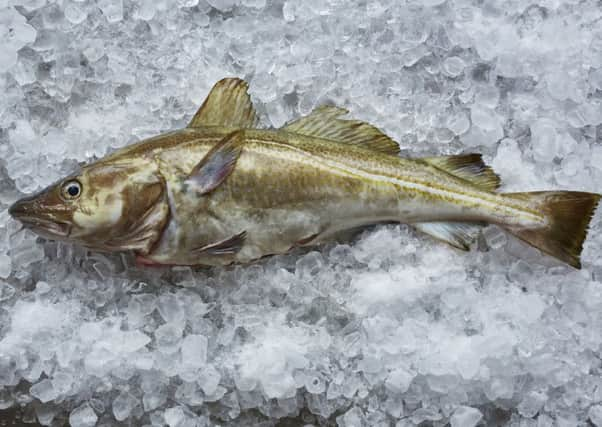People warned not to eat cod caught in North Sea due to shortage


UK-caught wild salmon should also remain off the menu for anyone concerned about safeguarding the environment.
The advice comes in the latest Good Fish Guide, compiled by the Marine Conservation Society (MCS), which allocates a sustainability rating for fish and shellfish based on how and where it is caught or farmed.
Advertisement
Hide AdAdvertisement
Hide AdThe guide uses a five-point grading and colour-coding system, going from dark green, for the best choice of fish to eat, through light green, yellow and orange to red, which should be avoided.
It is designed to help consumers make responsible decisions when eating out or shopping to cook at home.
According to the new ratings, the most sustainable seafood species from the UK are farmed mussels, king prawns and oysters; farmed Atlantic halibut; wild-caught herring from the North Sea and Irish Sea; wild-caught plaice from the North Sea; and UK-caught European hake.
Fish caught in the UK that should be avoided include cod, though catches from Iceland or the north-east Arctic are fine; the critically endangered European eel; wild Atlantic salmon, unless from the few Scottish rivers where stocks are considered healthy; whiting caught off the west coast; and wild Atlantic halibut, another endangered species.
Organically reared farmed salmon has been given a light-green (good) rating, while all other UK farmed salmon gets yellow (OK) due to concerns over ecological impacts.
Major changes in the way fisheries are managed are expected after Brexit, when the UK will take more control of stocks in national waters.
With many fish populations in a depleted state and the UK predicted to miss most marine environmental targets next year, the charity is warning that the future of numerous species cannot be guaranteed.
Experts believe it is more important than ever for consumers to consider how fisheries and fish farms are operating and to support environmentally friendly methods.
Advertisement
Hide AdAdvertisement
Hide Ad“UK-caught or farmed seafood can be a great sustainable option when done right, but it’s vital that people take note of what species they’re buying, where it was caught or farmed, and how,” said Charlotte Coombes, MCS Good Fish Guide manager.
“MCS’s Good Fish Guide looks at all of these key aspects, as well as wider environmental impacts and how well regulated the farms and fisheries are.
“Whatever the future of the UK’s relationship with the EU, shopping for sustainable UK seafood will help to support sustainable UK fishers and fish farmers and reduce the pressure on at-risk species.”
Cod was last rated red in 2014, but improving stocks has seen it rise to yellow. The new guide has upgraded sea bass from red to orange – yellow for some.